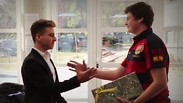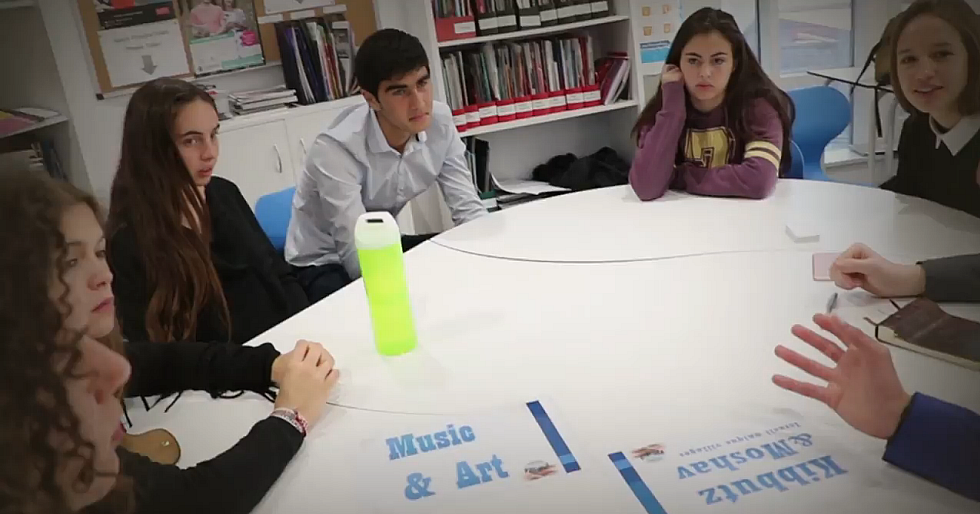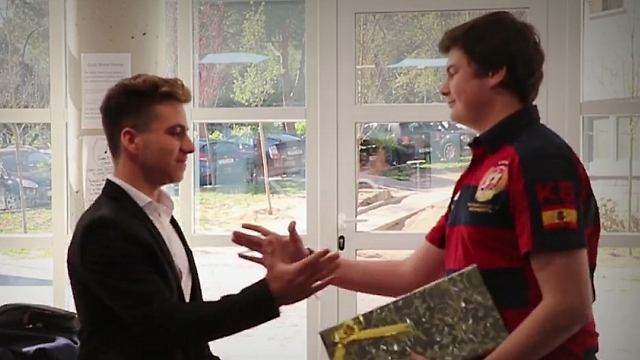

Israel's teen ambassadors on front line against BDS
While their friends go to the beach, 17-year-old Tal, Sean, Dolev and Adi will take advantage of their summer vacation to join the fight against BDS and improve Israel’s image among their peers from around the world: 'We show them the true Israel, not as it appears in the media.'
In cooperation with the Strategic Affairs and Information Ministry
Like the majority of their friends who are starting summer vacation, these high school kids will also work, have fun and maybe travel abroad with their families. However, they have another mission that they have taken upon themselves: to defend Israel’s name.
“There is a limit to what the government can do,” says Tal Namet, 17, who will begin 12th grade next year at Herzog High School in Kfar Saba. According to Namet, he was drawn to current affairs from a young age, and as such, when he heard about the “Israeli Center for Young Leaders”, he was quick to join. “I thought to myself that if I wanted to enrich my knowledge while volunteering and serving my country, I want to be there.”
The Young Leaders program—which is headed by former foreign ministry official Yitzhak Eldan—operates in the Ramat HaHayal neighborhood of Tel Aviv. The program is intended for students in grades 9-12 and trains Israeli youth from all walks of life to become “young ambassadors” for the State of Israel.
As part of the three-year program, participants learn various communication skills, acquire knowledge of current events—especially the Middle East and the Israeli-Palestinian conflict—and embark on a six-day delegation to another country where they meet with young people their age. The program's planners hope that the connections they forge abroad will help spread the truth about Israel on social media and help fight the de-legitimization campaign waged by boycott movements around the world.
“Our advantage is that we meet these kids right at the critical age,” says Namet, who travelled to Madrid, Spain on a delegation during Passover vacation. “They meet us when they are still in high school, before they get to colleges and universities that are full of incitement. At this stage, it is easier for them to connect to us and listen to us than it is for adult politicians.”
“Big changes start small and I feel we’ve made a change,” says Sean Dinor, 17, a student at Katznelson High School in Kfar Saba. “I came back from Madrid with the feeling that we had a lot of influence. We tried to deal less with politics, instead focusing on just being with them, talking to them and showing them that Israelis are exactly like them. It’s enough if one person is influenced, tells their friends that they have an Israeli friend and all of a sudden it doesn’t sound as bad as it is portrayed in the media.”
Even in the Ministry of Strategic Affairs—which has been leading the fight against The Boycott, Divestment, Sanctions (BDS) movement for the last two years—understands the potential value of the program and last year “adopted” it. As part of this adoption, the ministry funded the aforementioned delegation to Madrid and has already committed to funding two more trips to Sweden and Ireland; two countries in which a serious struggle over Israel’s image is underway.
“Every day we encounter de-legitimization as well as unfair and unjust treatment that movements like BDS espouse,” says Dolev Zeichner, 17, from Rabin High School in Kfar Saba. “Therefore, I have both an obligation and a desire to fix the situation.”
Adi Yehezkel, 17, Dolev’s friend from school, agrees. “The students from Madrid thought we lived in a war zone. They were really surprised to hear that we’re kids, just like them, and we aren’t afraid to walk in the streets," Yehezkel says. We showed them that we are the only democracy in the Middle East and that we support human rights—but like every other country in the world we have the need for an army to protect us.”
All the kids emphasized that the activities are completely apolitical. “The whole secret here is the encounter, meeting one another, forming a friendly connection,” says Snir Dolev, 31, Director of the Public Diplomacy Program at the Israeli Center for Young Leaders. “The innocence that kids bring with them breaks barriers, even among adults,” said Dolev.
These youth diplomats are already starting to have an impact, as evidenced by the recent delegation in Holland, the participants of which were subject to a hateful Facebook post published by a city councilman in The Hague, Abdoe Khoulani, who called the Israeli youngsters "future Zionist terrorists, occupiers and those who murder children."
According to Yehezkel, incidents like that only serve to motivate them and strengthen their resolve. “For exactly that reason, our activities are crucial,” she explained. “Today, almost everything is conducted on social media. The second one of us has a few Facebook friends from another country, all of our activities for Israel become viral. That is our biggest victory and that is why we constantly strengthen these connections.”
In cooperation with the Strategic Affairs and Information Ministry

















